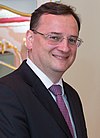Alexandr Vondra
Alexandr Vondra Czech Republic Ambassador to the United States | |
|---|---|
| In office 14 May 1997 – 10 October 2001 | |
| President | Václav Havel |
| Preceded by | Michael Žantovský |
| Succeeded by | Martin Palouš |
| Personal details | |
| Born | 17 August 1961 Prague, Czech Republic |
| Political party | Civic Democratic Party European Conservatives and Reformists Party |
| Alma mater | Univerzita Karlova |
| Profession | Politician |
| Signature | |
Alexandr Vondra (Czech pronunciation:
Vondra also served as Deputy Prime Minister for European Affairs between 2007 and 2009, as well as
He was candidate for the European Parliament seat in the 2019 election and received 29,536 preferential votes and was elected Member of the European Parliament representing the Civic Democratic Party (ODS).
Life
Vondra was born in
Politics
In 1990–1992, Vondra was foreign policy advisor to President Václav Havel.[1] When Havel stepped down from his office during the dissolution of Czechoslovakia and at the same time an independent Czech foreign service was being formed, Vondra became the Czech Republic's First Deputy Minister of Foreign Affairs in August 1992, responsible i. a. for negotiating the division of Czechoslovak diplomacy.[3] In 1996, he was a chief negotiator for the Czech-German Declaration on the Mutual Relations and their Future Development.[2] In March 1997 Vondra left to become the Czech Ambassador to the United States, staying there until July 2001.[3] From March 2001 to January 2003, Vondra was the Czech Government Commissioner responsible for the preparation of the 2002 Prague summit of NATO.[3] From January to July 2003 Vondra was a Deputy Foreign Minister.[3]
He became an ODS member only after his ministerial appointment and the victory in Senate elections in October 2006. He is generally perceived as pro-
Vondra was mentioned as a possible nominee to serve as European Commissioner in 2009.[5]
He participated at the international conference
In November 2012, he decided to step down from politics due to the mounting pressure, his defeat in the Senate elections and criticism over one of the contracts during the 2009 Czech Presidency of the Council of the European Union.[7]
In 2019, Vondra returned to politics when the Civic Democratic Party nominated him in European Parliament election. He was on 15th place on the party's list.[8] He received 29,536 preferential votes and was elected.[9]
Vondra then ran for the position of Vice-Chairman of ODS. He received 443 votes of 502 which was more than any other candidate and was elected.[10]
Teaching
After his 2012 exit from politics, Vondra served as director of the Prague Centre for Transatlantic Relations at the CEVRO Institute in Prague, as well as an instructor for both Bachelor and Master level courses at the university.[11]
Family
He is married and has three children with his wife Martina: Vojtěch (1991), Anna (1993) and Marie (1996).[1] He has another child, Jáchym (1992), with Veronika Vrecionová.
Trivia

In 2014, he rejected
References
- ^ a b c d e "RNDr. Alexandr Vondra". Government of the Czech Republic. Archived from the original on 2008-02-06. Retrieved 2008-02-11.
- ^ a b c Lenka Ponikelská. "'Saša' Vondra: dissident minister". Czech Business Weekly. Retrieved 2008-02-11.[permanent dead link]
- ^ a b c d "Dr. Alexandr Vondra". Alexandr Vondra official website. Archived from the original on 21 February 2008. Retrieved 2008-02-11.
- ^ Jana Mlčochová. "Russian crude, Aero's deal and the ČSA trap". Czech Business Weekly. Retrieved 2008-02-11.
[Vondra is] Known for his pro-Western and especially pro-U.S. stance
[dead link] - ^ "Czech running mates?". POLITICO. Retrieved 1 April 2016.
- ^ "Prague Declaration on European Conscience and Communism - Press Release". Victims of Communism Memorial Foundation. 9 June 2008. Archived from the original on 2010-03-16. Retrieved 2011-05-10.
- ^ "Ve vládě končí další ministr. Vondra odchází z obrany". Economia, a.s. Aktuálně.cz. 2012-11-28. Retrieved 25 May 2023.
- ^ "Vondra se vrací do politiky, za ODS kandiduje v eurovolbách. Jedničkou je Zahradil". Aktuálně.cz (in Czech). 21 January 2019. Retrieved 19 January 2020.
- ^ "Eurovolby: "Skokan" Vondra uspěl z 15. místa. Uspěl i generál Hynek Blaško". Blesk.cz. 27 May 2019. Retrieved 19 January 2020.
- ^ "Havloid se hlásí, řekl Vondra ODS. Chce, ať Češi vyberou národního ptáka". iDNES.cz. 18 January 2020. Retrieved 19 January 2020.
- ^ "Prague Centre for Transatlantic Relations (PCTR) - CEVRO INSTITUTE". cevroinstitut.cz. Retrieved 2017-08-20.
- ^ "Prague Post". Archived from the original on 2015-06-24. Retrieved 2015-06-24.
- ^ "Východoevropští disidenti moc netrpěli, otřel se Chomsky o Havla a spol". Lidovky.cz. 5 June 2014. Retrieved 1 April 2016.
- ^ Martin Hekrdla. "Lesk a bída drzých čel". Literární noviny. Archived from the original on 19 December 2014. Retrieved 1 April 2016.
External links
- Official website
- Vondra's statement at the general debate of the 61st session of the United Nations General Assembly (scanned images in PDF format)




